Now in his 99th year, Jim Davison continues to entertain Bangkok audiences with his weekly radio programme
| FOR the past seven decades, this remarkable Australian has used his mellifluous voice and deep musical knowledge to travel the world as a deejay. On the way, he has met all kinds of celebrities and characters, including many he encountered in Thailand, his home for almost 50 years. Despite approaching his 100th birthday, Jim has no thoughts of retiring or slowing down; indeed, only two months ago he underwent surgery for three teeth implants and he still buys green bananas. His ‘Anything Goes’ show airs on 93.5FM every Sunday from 8.30pm to 10pm. |
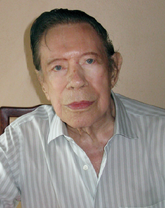
In the following article, Jim Davison recalls the launch of the popular “Early Bird Show” in Bangkok in the mid-’60s, and the challenges he often faced at the whim of the broadcasting authorities here.
“AFTER freelancing for decades in big cities, and now past 50, I thought a change of pace might open up new perspectives. I forsook the bright lights of Hong Kong for a short assignment in tiny, pampered oil-rich Brunei, which I found friendly but incredibly dull. But it did provide the most dramatic highlight of my radio career – recording the wedding of their Crown Prince (now the Sultan of Brunei), a lavish ceremony that lasted for five days.
When the excitement of that assignment died down, however, I yearned once more for big city life, and took up a suggestion from my long time friend Sam Scott, then a resident of Thailand, to come to The Big Mango, which he assured me was a Pandora’s Box of opportunities. The year was 1965.
My first port of call when I arrived in Bangkok was the Majestic Hotel on Rachadamnoen Avenue. From my hotel window I looked across the Avenue at the old Chalerm Thai Theatre, its walls plastered with colourful billboards advertising the current attraction – Dr. Zhivago. I had arrived!
And Sam’s Pandora’s Box prediction was right: I visited the radio section of the Thai Public Relations Department, then in the process of upgrading its flagship radio frequency 95FM (Tor Tor Tor), and when the operators learned I was in radio they were more than interested, suggesting an escorted visit to the 95FM studios. I politely declined the offer and said I would be happy if allowed to visit the studios in the early morning. They agreed.
At 5.30am the next day, I paid my surprise visit. When the staff learned the reason for the call everyone was kind and helpful. But I was not quite prepared for what I saw. Food trays lay scattered around, the waste-paper baskets crammed with plastic wrappers and containers…the air filled with tobacco smoke, and some youths in an ante room playing cards. In one corner was the Chinese-Thai announcer sorting out his papers for the morning broadcast. It looked more like a domestic scene rather than a radio station.
Khun Panat, one of the technicians, who spoke excellent English, showed me the library which appeared to be well stocked, but the rest of the set up had long passed its shelf life.
At five minutes to the hour Panat suggested I go into the control room to check the station’s output. The music was pleasant, though a bit mixed, but the announcer struggling with his English was far from professional.
At 7am an elderly foreigner came in to read the news. He shuffled his papers, and there was a lot of dead airtime when he lost his way on the script. His Scottish accent was so thick I hardly understood a word he was saying. Right there I got the impression that anyone who professed to speak English could come in “and give it a go.” But in spite of these shortcomings, I felt that with a few adjustments a good morning show could be set up, and returned to the Majestic with a head full of ideas.
On my second visit to Public Relations I felt more confident, and submitted a rough draft of what I had in mind – a draft that was immediately approved in principle.
But then came a snag! Government salaries were very low at the time and it would hardly be feasible to expect a high degree of dedication and professionalism with such low pay. How to get around this important issue?
At that meeting it was interesting to learn that new radio equipment was on its way from the UK, including a Wilkinson multi-plex transmitter. Apparently it was time for Thai radio to take on a new look. At the end of the meeting I asked for a two week break to allow me to explore sponsorship possibilities, and find a way around the wages problem.
“AFTER freelancing for decades in big cities, and now past 50, I thought a change of pace might open up new perspectives. I forsook the bright lights of Hong Kong for a short assignment in tiny, pampered oil-rich Brunei, which I found friendly but incredibly dull. But it did provide the most dramatic highlight of my radio career – recording the wedding of their Crown Prince (now the Sultan of Brunei), a lavish ceremony that lasted for five days.
When the excitement of that assignment died down, however, I yearned once more for big city life, and took up a suggestion from my long time friend Sam Scott, then a resident of Thailand, to come to The Big Mango, which he assured me was a Pandora’s Box of opportunities. The year was 1965.
My first port of call when I arrived in Bangkok was the Majestic Hotel on Rachadamnoen Avenue. From my hotel window I looked across the Avenue at the old Chalerm Thai Theatre, its walls plastered with colourful billboards advertising the current attraction – Dr. Zhivago. I had arrived!
And Sam’s Pandora’s Box prediction was right: I visited the radio section of the Thai Public Relations Department, then in the process of upgrading its flagship radio frequency 95FM (Tor Tor Tor), and when the operators learned I was in radio they were more than interested, suggesting an escorted visit to the 95FM studios. I politely declined the offer and said I would be happy if allowed to visit the studios in the early morning. They agreed.
At 5.30am the next day, I paid my surprise visit. When the staff learned the reason for the call everyone was kind and helpful. But I was not quite prepared for what I saw. Food trays lay scattered around, the waste-paper baskets crammed with plastic wrappers and containers…the air filled with tobacco smoke, and some youths in an ante room playing cards. In one corner was the Chinese-Thai announcer sorting out his papers for the morning broadcast. It looked more like a domestic scene rather than a radio station.
Khun Panat, one of the technicians, who spoke excellent English, showed me the library which appeared to be well stocked, but the rest of the set up had long passed its shelf life.
At five minutes to the hour Panat suggested I go into the control room to check the station’s output. The music was pleasant, though a bit mixed, but the announcer struggling with his English was far from professional.
At 7am an elderly foreigner came in to read the news. He shuffled his papers, and there was a lot of dead airtime when he lost his way on the script. His Scottish accent was so thick I hardly understood a word he was saying. Right there I got the impression that anyone who professed to speak English could come in “and give it a go.” But in spite of these shortcomings, I felt that with a few adjustments a good morning show could be set up, and returned to the Majestic with a head full of ideas.
On my second visit to Public Relations I felt more confident, and submitted a rough draft of what I had in mind – a draft that was immediately approved in principle.
But then came a snag! Government salaries were very low at the time and it would hardly be feasible to expect a high degree of dedication and professionalism with such low pay. How to get around this important issue?
At that meeting it was interesting to learn that new radio equipment was on its way from the UK, including a Wilkinson multi-plex transmitter. Apparently it was time for Thai radio to take on a new look. At the end of the meeting I asked for a two week break to allow me to explore sponsorship possibilities, and find a way around the wages problem.
| Those next few weeks were extremely busy – but fruitful. Mr. Bond of Ital Thai Construction and Mr. Battliwalla of Air India were very co-operative and said they could arrange for airtime to be paid in advance. So far so good! Other prospective sponsors were interested but more reserved. They remembered the previous failed attempts to get a morning programme on the air. On a third visit to Public Relations I put forward an idea for their consideration…an idea that might get around the wages question. Each year members of the studio staff would be given a holiday in Hong Kong with all expenses paid – including pocket money; there would be two staff parties in the Oriental Hotel’s Normandie Grill (more affordable then); and I would give a personal gift at the end of the year. Public Relations were intrigued and delighted with the novel idea – especially Khun Somchit, head of English Language Programmes who had worked hard and diligently to improve the quality of Thai broadcasting. Pleased, too, was the staff in spite of the new restrictions – no food to be brought into the studios, no uninvited guests, no smoking, no gambling. And a time clock installed to check the comings and goings. No complaints from anyone. I had to agree on my part to limit commercial time to 10 minutes per hour, avoid controversial religious and political issues, and abide by all existing broadcasting regulations. |
On their part, Public Relations agreed there would be no intrusions into the three hours, 6am to 9am Monday to Friday, and I would have control over the programmes’ content and procedure. It was also agreed, verbally, that no competing airtime would be aired from any of their other frequencies. In addition I would be required to pay a monthly sum, in advance, for the use of the station’s facilities.
With a final Contract drawn up the only thing left was to name the programme. “Early Bird Show” won hands down. Starting date was scheduled for the first Monday in February 1966.
That sunny February morning was one to remember. With Somchit sitting beside me everything went off without a hitch. The technicians did a great job with not a missed cue.
Within an hour the phone began to ring…and ring…and ring…Agents and companies clamoured for airtime…everyone was excited by the quick response. The Early Bird had really taken off. Taken everyone by surprise, too.
There were a few disappointed prospective sponsors, due in some measure to the ruling ‘no competing sponsors,’ and to cope with the overflow a late night show “Whisky and Sofa’ went on the air from 95FM. In no time it, too, was fully booked.
Thai radio had become “big time.” Commercials increased in price from 350 baht to over 1,000 within three months.
As the months went by the Early Bird Show became part of Bangkok’s mornings. Two bright young ladies, Rosemary and Valery, joined us for an hour to add to the fun. Sadly, youthful vivacious Rosemary committed suicide; Valery is still around and lives in Sydney.
Soon after the Early Bird started I acquired an expensive and professional recorder from Sweden. With the expert assistance of technician Khun Panat it was possible to get some interesting “scoops” for the morning show.
Bob Hope, the king of entertainers, gave a half hour chat in his room at the Erawan Hotel; Margaret Whiting was a joy to meet at the old Rama Hotel (now Holiday Inn) on Silom; Johnny Mathis was just great at the Café de Paris; The Platters came on the Show several times and became good friends; and singers Gerry Scott and Maggie Bowra were favourites with the morning listeners.
Sam Scott’s Pub, The Yard of Ale, on Silom often provided the backdrop for interviews and musical occasions – interesting snippets much appreciated. Sam died a few years ago, aged 83, in the US.
All this activity amounted to a heavy workload. Even though Whisky and Sofa was recorded, it entailed much preparation. My morning began at 3.30am at which time I went to the offices of the Bangkok World newspaper located just off Rachadamnoen Avenue. With the kind assistance of John Sutherland, local and international news items were taken directly from the press, which meant that our news was up to date and even more up to date than the newspapers – our bulletin was read live at 7am, with 10 minutes of local news and 20 minutes of international news (half an hour of highly condensed items).
With a final Contract drawn up the only thing left was to name the programme. “Early Bird Show” won hands down. Starting date was scheduled for the first Monday in February 1966.
That sunny February morning was one to remember. With Somchit sitting beside me everything went off without a hitch. The technicians did a great job with not a missed cue.
Within an hour the phone began to ring…and ring…and ring…Agents and companies clamoured for airtime…everyone was excited by the quick response. The Early Bird had really taken off. Taken everyone by surprise, too.
There were a few disappointed prospective sponsors, due in some measure to the ruling ‘no competing sponsors,’ and to cope with the overflow a late night show “Whisky and Sofa’ went on the air from 95FM. In no time it, too, was fully booked.
Thai radio had become “big time.” Commercials increased in price from 350 baht to over 1,000 within three months.
As the months went by the Early Bird Show became part of Bangkok’s mornings. Two bright young ladies, Rosemary and Valery, joined us for an hour to add to the fun. Sadly, youthful vivacious Rosemary committed suicide; Valery is still around and lives in Sydney.
Soon after the Early Bird started I acquired an expensive and professional recorder from Sweden. With the expert assistance of technician Khun Panat it was possible to get some interesting “scoops” for the morning show.
Bob Hope, the king of entertainers, gave a half hour chat in his room at the Erawan Hotel; Margaret Whiting was a joy to meet at the old Rama Hotel (now Holiday Inn) on Silom; Johnny Mathis was just great at the Café de Paris; The Platters came on the Show several times and became good friends; and singers Gerry Scott and Maggie Bowra were favourites with the morning listeners.
Sam Scott’s Pub, The Yard of Ale, on Silom often provided the backdrop for interviews and musical occasions – interesting snippets much appreciated. Sam died a few years ago, aged 83, in the US.
All this activity amounted to a heavy workload. Even though Whisky and Sofa was recorded, it entailed much preparation. My morning began at 3.30am at which time I went to the offices of the Bangkok World newspaper located just off Rachadamnoen Avenue. With the kind assistance of John Sutherland, local and international news items were taken directly from the press, which meant that our news was up to date and even more up to date than the newspapers – our bulletin was read live at 7am, with 10 minutes of local news and 20 minutes of international news (half an hour of highly condensed items).
| The first year passed with the Early Bird riding the crest of success. Broadcast on AM, FM and Short wave it had enormous coverage. Radio stations outside Bangkok “snitched” our news, and there were many calls from listeners overseas. But I believe the overall success of the show was due to our range of music chosen with care, and a leisurely, relaxed format appropriate for a country whose mother tongue is not English. There were no recorded commercials. The advertising was woven into the continuity, a practice I adhere to until today. And the usual slickness of big time radio was replaced with an intimate, friendly approach. This first year was also the time when the technicians took off for their well earned holiday in Hong Kong. On that Friday morning, Maitri and Nippon were the envy of all those who gathered to wish them well…It was more like an emigration than a short trip abroad. Tickets and baggage in hand the two were ready for the flight, thrilled to bits because neither had been out of the country, let alone been on a plane. It was a noisy send off. |
Over the next two years one major event took place. The Thai Army launched its own radio station, located in handsome surrounds, and fitted with the most modern equipment. A morning show was their first priority and advertising luminaries like Lee Evans, Elizabeth Banabas, Bessie Castanadas and John Dhienn were recruited. It looked like formidable competition. Yes, there was a little rivalry, but it was friendly rivalry as there was plenty of honey to go around – no shortage of sponsors. The station opened with great fanfare and great sound.
Six months later disaster struck! In the early hours of the morning the 95FM complex burned to the ground with a loss of life – the watchman. Everything was thrown into confusion. What next?
Very quickly, the Public Relations arranged for a studio to be set up in one of their own premises. Within 48 hours, bruised and battered, the Early Bird rose from the ashes now working from crumby and cramped quarters. Not one sponsor dropped out. It was business as usual.
It’s only natural in a medium like radio, where the entertainers are heard but not seen, for listeners to send little gifts to favorites they will never meet. Fantasies are created…fantasies which more often than not bear little resemblance to reality. It’s not unheard of for a listener to fall in love with someone just heard. Life is strange.
During my time with the Early Bird Show I received many little gifts like chocolates or flowers. But along with those gifts also came some other kinds of messages – pictures of naked bodies…dirty limericks…pornographic postcards…offers of all kinds of kinky behavior if I could name the time and place. They came from both male and female listeners, some of whom brave enough to give their names and addresses – and phone numbers.
What prompted the assumption I was aligned with sex, vice and perversion; a disciple of Rasputin, Casanova, the Marquis de Sade? Maybe it was something I said or did. Could be! One kind lady sent a tray of goodies to the studio every Friday. But one Friday when the goodies didn’t come, her husband did, and threatened to bash my face in if I didn’t stop seducing his wife. Not a dull moment on the morning show.
After almost five years of working alone, the strain began to show. This, together with the recurrence of a rare blood disease contracted in Venezuela in 1962, gave me no option other than to bow out. It was a sad decision but there was one consolation: the Early Bird had obtained its objective – heard in every home, hotel, taxi and bus, and was a real part of the Bangkok scene. In other words: my biggest success ever.
After three months of medical treatment in Japan I returned to Bangkok refreshed, and began looking around for something undemanding to do.
The Public Relations had no intention of taking the Early Bird off the air. Entrepreneur Phil Murray and his working partner, Garrick Law, took over. Some changes were made. The morning features disappeared, replaced with more commercials. The “no competing sponsor” clause bit the dust. Garrick was the announcer.
Two years after Phil and Garrick took control came another bombshell. With no prior notice all English language programmes were banned. There was no advance warning, no indication that such a thing could happen. But it did. The next morning Thai music took the place of the Early Bird. A loud outcry from the listeners went unheard. The Early Bird had made its last flight…
The order was an unexpected and drastic blow. Phil and I got together to prepare tapes for Hotels in Bangkok and Pattaya, to be played on the in-house equipment. The tapes were issued free of cost and contained the hotels’ promotions, along with commercials paid for by sponsors.
Six months later disaster struck! In the early hours of the morning the 95FM complex burned to the ground with a loss of life – the watchman. Everything was thrown into confusion. What next?
Very quickly, the Public Relations arranged for a studio to be set up in one of their own premises. Within 48 hours, bruised and battered, the Early Bird rose from the ashes now working from crumby and cramped quarters. Not one sponsor dropped out. It was business as usual.
It’s only natural in a medium like radio, where the entertainers are heard but not seen, for listeners to send little gifts to favorites they will never meet. Fantasies are created…fantasies which more often than not bear little resemblance to reality. It’s not unheard of for a listener to fall in love with someone just heard. Life is strange.
During my time with the Early Bird Show I received many little gifts like chocolates or flowers. But along with those gifts also came some other kinds of messages – pictures of naked bodies…dirty limericks…pornographic postcards…offers of all kinds of kinky behavior if I could name the time and place. They came from both male and female listeners, some of whom brave enough to give their names and addresses – and phone numbers.
What prompted the assumption I was aligned with sex, vice and perversion; a disciple of Rasputin, Casanova, the Marquis de Sade? Maybe it was something I said or did. Could be! One kind lady sent a tray of goodies to the studio every Friday. But one Friday when the goodies didn’t come, her husband did, and threatened to bash my face in if I didn’t stop seducing his wife. Not a dull moment on the morning show.
After almost five years of working alone, the strain began to show. This, together with the recurrence of a rare blood disease contracted in Venezuela in 1962, gave me no option other than to bow out. It was a sad decision but there was one consolation: the Early Bird had obtained its objective – heard in every home, hotel, taxi and bus, and was a real part of the Bangkok scene. In other words: my biggest success ever.
After three months of medical treatment in Japan I returned to Bangkok refreshed, and began looking around for something undemanding to do.
The Public Relations had no intention of taking the Early Bird off the air. Entrepreneur Phil Murray and his working partner, Garrick Law, took over. Some changes were made. The morning features disappeared, replaced with more commercials. The “no competing sponsor” clause bit the dust. Garrick was the announcer.
Two years after Phil and Garrick took control came another bombshell. With no prior notice all English language programmes were banned. There was no advance warning, no indication that such a thing could happen. But it did. The next morning Thai music took the place of the Early Bird. A loud outcry from the listeners went unheard. The Early Bird had made its last flight…
The order was an unexpected and drastic blow. Phil and I got together to prepare tapes for Hotels in Bangkok and Pattaya, to be played on the in-house equipment. The tapes were issued free of cost and contained the hotels’ promotions, along with commercials paid for by sponsors.
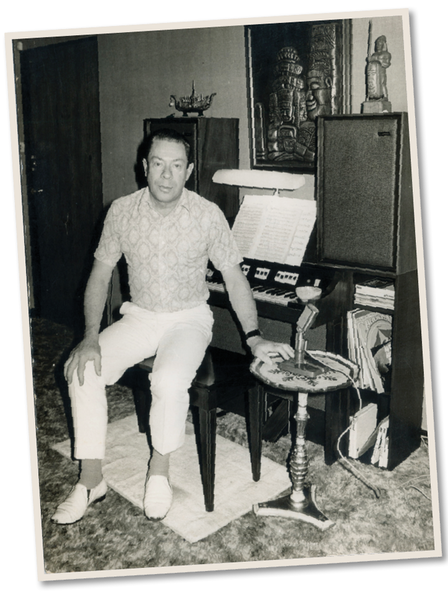 There’s no place like home: Jim at his pad in Banglamphu
There’s no place like home: Jim at his pad in Banglamphu The Hotels were pleased with the idea as it cost them nothing. Tapes were replaced every month with new music and dialogue. I compiled the tapes, Phil looked after the advertising. The money came rolling in…
Some months later the radio ban was partially lifted if the presenters were Thai. A little later the ban was relaxed even more. Foreigners could present the programme, but the commercials had to be read by a Thai. This rather awkward stipulation was a bit difficult, but I managed to helm some successful evening and night shows, with the help and co-operation of some talented Thai announcers.
The ban lasted for many years and the authorities must have grown tired of me knocking on the Pearly Gates offering formats and suggestions. One day my plea was heard by an ex-director of broadcasting who, in a matter of days, gave me the go-ahead for the four-hour night show ‘Anything Goes’ from frequency 98.5FM.
That was more than 20 years ago. Anything Goes is still running, but recently moved to frequency 93.5. It now begins at 8.30pm and ends at 10pm – Sunday only – a shortened time not because of the lack of sponsors, but because of lack of airtime for an English speaking show.
Coming from a family with a theatrical background it was my secret ambition to be a good singer or pianist. I was mediocre on both counts. It was radio that provided a lifetime of pleasure and fulfillment, brought me in contact with interesting people and in spite of the hard work, gave me lots of enjoyment.
How gratifying it is today to have those young men I worked with so long ago, call me up at the station to say “hello.” They are old men now – but they still remember. And the other “oldies” who keep in touch because they, too, were around in the mid ’60s when the Early Bird was so much part of the scene.
It seems ironic that I should have been here to establish and present Bangkok’s first successful English language commercial radio show, and still be around to see its possible demise.
Glittering cocktail parties have been held to herald newcomers to the field, but all have gone now. I seem to be the only one left, with that uneasy feeling of standing alone in a fairground after everyone’s gone home.
Yes, I often thought of retiring, travelling the world, visiting new places, revisiting old scenes…living the life of Riley. But now it is not to be. It’s twilight time. Next year I celebrate my 100th birthday.
It now takes me longer to dress, longer to get to the station, longer to do anything. But when that ON AIR light blinks I feel it’s all worthwhile.
Perhaps the party was not all I hoped for, but now that I’m here I might as well dance.
Some months later the radio ban was partially lifted if the presenters were Thai. A little later the ban was relaxed even more. Foreigners could present the programme, but the commercials had to be read by a Thai. This rather awkward stipulation was a bit difficult, but I managed to helm some successful evening and night shows, with the help and co-operation of some talented Thai announcers.
The ban lasted for many years and the authorities must have grown tired of me knocking on the Pearly Gates offering formats and suggestions. One day my plea was heard by an ex-director of broadcasting who, in a matter of days, gave me the go-ahead for the four-hour night show ‘Anything Goes’ from frequency 98.5FM.
That was more than 20 years ago. Anything Goes is still running, but recently moved to frequency 93.5. It now begins at 8.30pm and ends at 10pm – Sunday only – a shortened time not because of the lack of sponsors, but because of lack of airtime for an English speaking show.
Coming from a family with a theatrical background it was my secret ambition to be a good singer or pianist. I was mediocre on both counts. It was radio that provided a lifetime of pleasure and fulfillment, brought me in contact with interesting people and in spite of the hard work, gave me lots of enjoyment.
How gratifying it is today to have those young men I worked with so long ago, call me up at the station to say “hello.” They are old men now – but they still remember. And the other “oldies” who keep in touch because they, too, were around in the mid ’60s when the Early Bird was so much part of the scene.
It seems ironic that I should have been here to establish and present Bangkok’s first successful English language commercial radio show, and still be around to see its possible demise.
Glittering cocktail parties have been held to herald newcomers to the field, but all have gone now. I seem to be the only one left, with that uneasy feeling of standing alone in a fairground after everyone’s gone home.
Yes, I often thought of retiring, travelling the world, visiting new places, revisiting old scenes…living the life of Riley. But now it is not to be. It’s twilight time. Next year I celebrate my 100th birthday.
It now takes me longer to dress, longer to get to the station, longer to do anything. But when that ON AIR light blinks I feel it’s all worthwhile.
Perhaps the party was not all I hoped for, but now that I’m here I might as well dance.

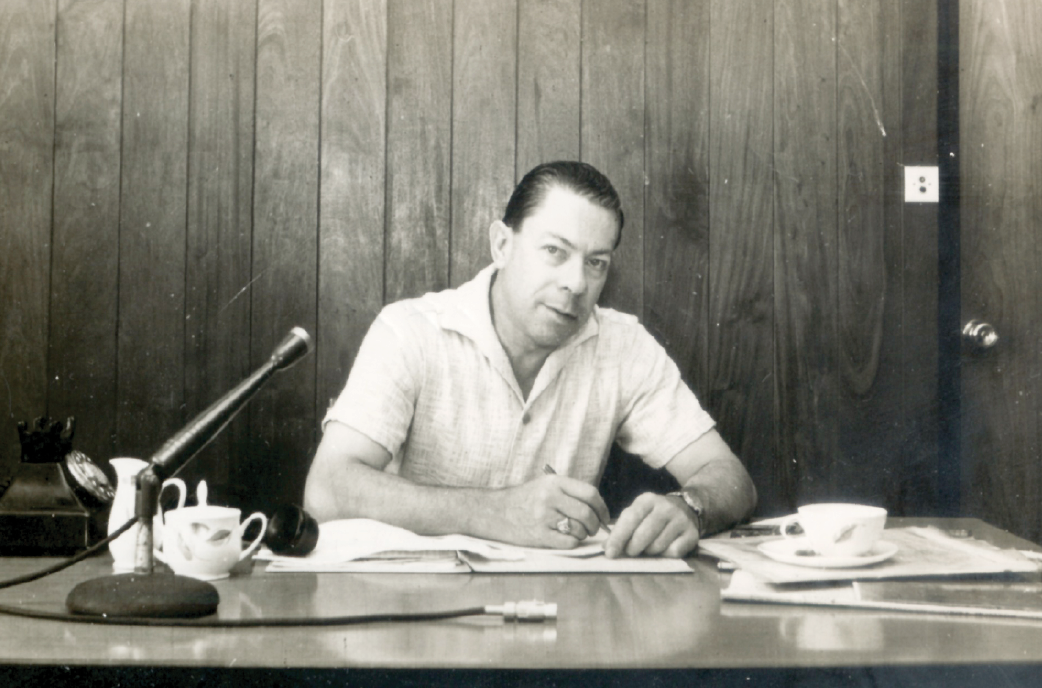


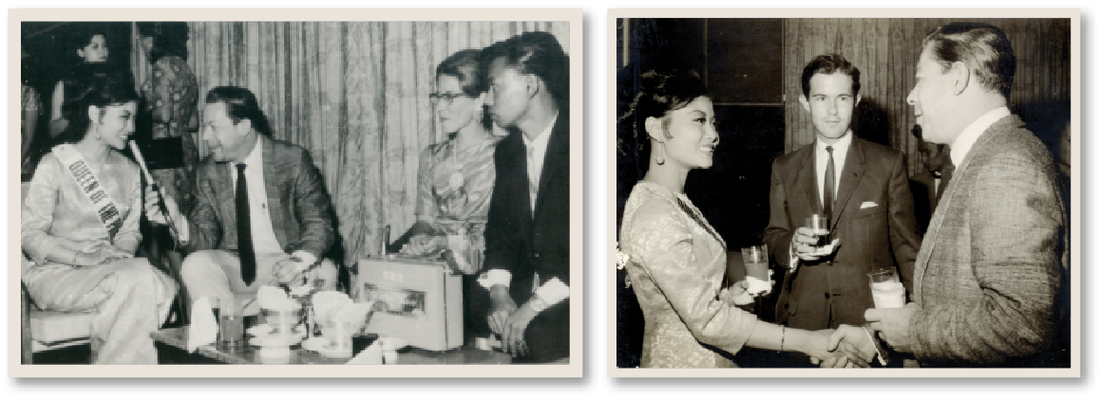
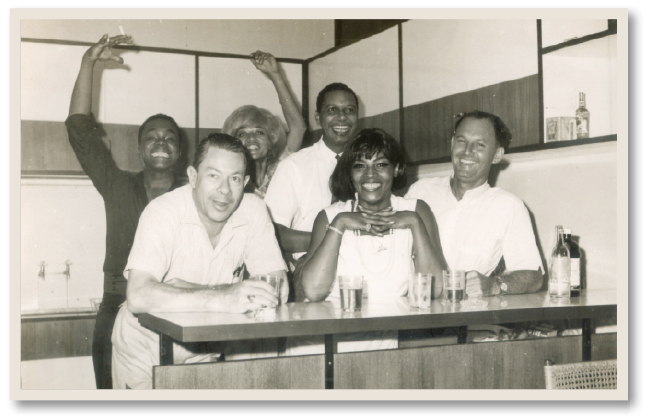
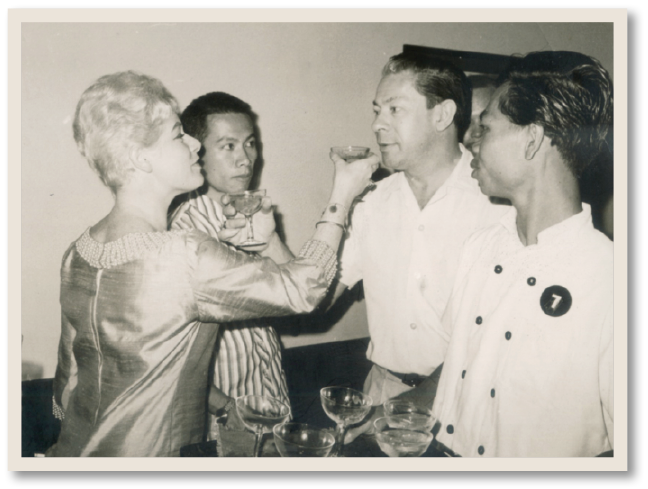
 RSS Feed
RSS Feed
















